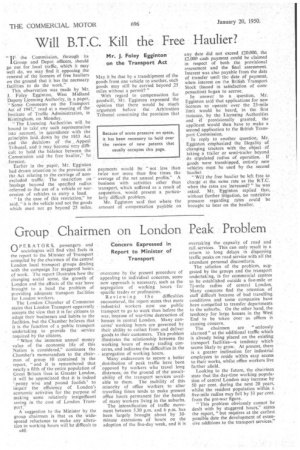Group Chairmen on London Peak Problem
Page 58

If you've noticed an error in this article please click here to report it so we can fix it.
Concern Expressed in Report to Minister of Transport
OPERATORS, passengers and sociologists will find vital facts in the report to the Minister of Transport compiled by the chairmen of the central London local transport groups dealing with the campaign for staggered hours of work. The report illustrates how the changing social scene, the growth of London and the effects of the war have brought to a head the problem of providing adequate transport facilities for London workers.
The London Chamber of Commerce states that London Transport apparently accepts the view that it is for citizens to adapt their businesses and habits to the facilities, but the Chamber believes that it is the function of a public transport undertaking to provide the service required by the citizens.
"When the immense annual money value of the economic life of this Nation is considered," continues the Chamber's memorandum to the chairman of group 10 contained in the report, "and it is remembered that nearly a fifth of the entire population of Great Britain lives in Greater London, it will be appreciated that it is indeed 'penny wise and pound foolish' to impair the efficiency of London's economic activities for the purpose of making some relatively insignificant saving in the cost of London Transport.: A suggestion to the Minister by the group chairmen is that as the widespread reluctance to make any alteration in working hours will be difficult to a4() overcome by the present procedure of appealing to individual concerns, some new approach is necessary, such as the segregation of working hours for specific trades or professions.
Reviewing the difficulties encountered, the report states that more industrial workers now use public transport to go to work than before the war, because of war-time destruction of houses in central London. Many concerns' working hours are governed by their ability to collect from and deliver goods to their customers. This problem illustrates the relationship between the working hours of many trading concerns, and indicates the difficulties in the segregation of working hours.
Many endeavours to secure a better distribution of peak traffic have been opposed by workers who travel long distances, on the ground of the unsuitability of the transport services• available to them. The inability of this minority of office workers to alter travelling times tends to make present office hours permanent for the benefit of many workers living in the suburbs.
The intensification of traffic movement between 530 p.m. and 6 p.m. has been largely brought about by 30minute extensions of hours on the adoption of the five-day week, and it is overtaking the capacity of road and rail...services. This can only result in a return to tong delays in dispersing traffic peaks on road service with all the attendant personal discomforts.
The solution of the problem, suggested by the groups and the transport undertaking, is for commercial centres to be established outside a five-mile or 74-mile radius of central London. Many concerns find the retention of staff difficult because of bad travelling conditions and some companies have been compelled to transfer departments to the suburbs. On the other hand, the tendency for large houses in the West End to be taken over as offices is causing concern.
The chairmen are "seriously alarmed" at the additional traffic which is already being placed on the existing transport facilities—a tendency which seems likely to grow. At present, there is a greater inclination for industrial employees to reside within easy access to their works, whilst office workers live farther afield.
Looking to the future, the chairmen state that the day-time working population of central London may increase by 50 per cent. during the next 20 years, whilst the resident population within a five-mile radius may fall by 33 per cent. from the pre-war figure.
"This problem obviously cannot be dealt with by staggered hours," states the report, "but requires at the earliest possible date the development of extensive additions to the transport services."




















































































